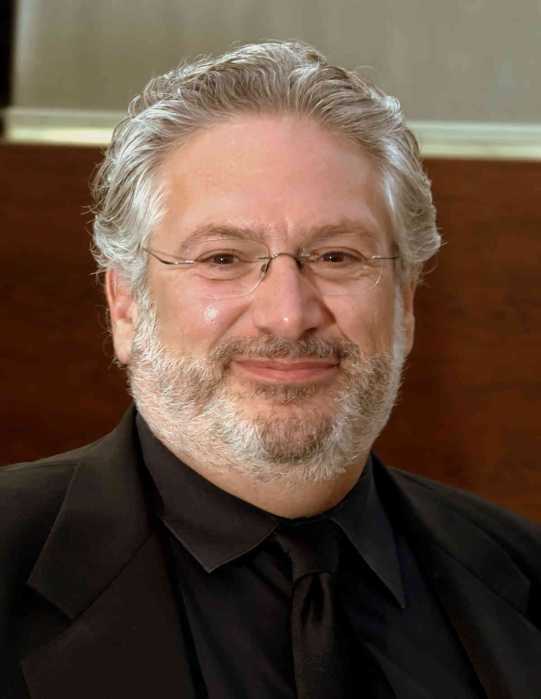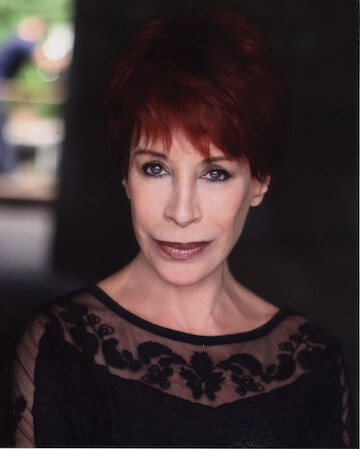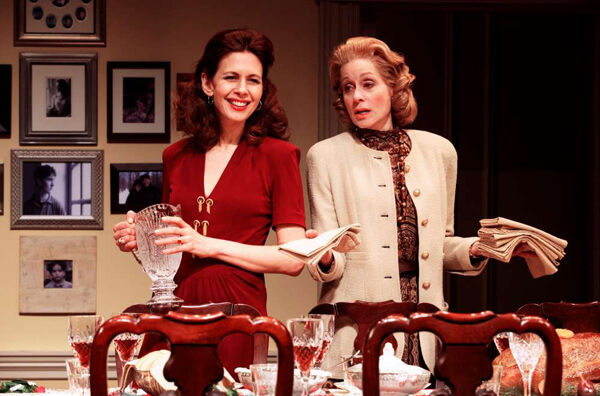Gabriel Ebert and Harvey Fierstein in Martin Sherman's “Gently Down the Stream,” directed by Sean Mathias, at the Public Theater through May 21. | JOAN MARCUS
BY DAVID KENNERLEY | When it comes to queer theater, no one is more talented — or eminently influential — than Harvey Fierstein. “Torch Song Trilogy,” “La Cage Aux Folles,” “Hairspray,” “Casa Valentina,” “Kinky Boots” — these are just a few of the iconic works he wrote or starred in (or both). And remember, he was one of the first-ever out gay celebrities and has long been a driving force for LGBTQ causes.
At age 62, the gravel-voiced virtuoso shows no signs of slowing down. Somehow, between adapting the book for NBC’s upcoming live broadcast of “Bye Bye Birdie” (starring Jennifer Lopez) and re-jiggering the text for the first-ever Broadway revival of “Torch Song” (starring Michael Urie), Fierstein has returned to his downtown Off-Broadway roots in Martin Sherman’s “Gently Down the Stream,” courtesy of the Public Theater.
The delicate drama is a meditation on 75 years of the gay rights crusade, chronicling its highs and lows as filtered through Beau (Fierstein, in top form), a cocktail pianist who witnessed many of those events. Both personal and universal, intimate and epic, the play, directed by Sean Mathias, is nothing short of astonishing.
Two newcomers examine crucial queer issues through sharp, unforgiving lenses
Not that the endeavor comes off as a history lesson. It’s actually a poignant love story between Beau, born in New Orleans and now living in London, and an eccentric young lawyer with bipolar tendencies named Rufus (Gabriel Ebert, who appeared in “Casa Valentina”). The romance starts in 2001 as a Gaydar hookup and continues for well over a decade. Never mind that Rufus ends up taking another lover, Harry (Christopher Sears), a tattooed performance artist, on the side.
Rufus insists that Beau recount his personal stories against the backdrop of landmark moments in gay history, even videotaping them for posterity. In the 1960s, Beau played piano for legendary cabaret singer Mabel Mercer, a cherished gay icon who sang torch songs about elusive male lovers written by homosexual men like Cole Porter and Noël Coward.
Rufus suggests the era of secrecy and furtiveness was a romantic time, much better than now.
“So it seemed, but it wasn’t,” Beau replies. “Everyone was in pain, my dear. Someone like Mabel confirmed our misery and mythologized it, but misery it was. And as a result, everyone was drunk.”
Beau recalls the heady gay scene in Times Square (the Astor Bar and the YMCA, in particular) during World War II, where sailors and soldiers would make discreet contact. Once the war ended, McCarthyism put a stop to all that.
He tells how he lost his lover, George, an energetic director of an avant-garde theater troupe, to AIDS in the 1980s. The most affecting recollection concerns his beloved Kip, a hippie activist who perished in the infamous 1973 UpStairs Lounge arson attack in New Orleans, along with 31 other gay men. Beau was at the scene that night, but survived.
When civil unions become legal in the UK, Rufus asks Beau to make their relationship “real, under the law.” Beau will have none of it, declaring, “We’re supposed to be outlaws inventing new rules, not imitating the old conventions,” mirroring sentiments also voiced in “Daniel’s Husband.”
Further evoking the power of the past is Derek McLane’s majestic set of Beau’s cluttered London flat, with walls lined with shelves stuffed with musty old books, bric-a-brac, and other mementoes of a life richly lived.
What makes this nostalgic yet unsentimental drama truly sublime is that these stories are told by the masterful Fierstein. Not only are we learning these stories vital to queer history, beautifully told, but we are witnessing a slice of history itself.
When the Supreme Court struck down DOMA in 2013, paving the way for federal recognition of same-sex marriage, all the gays across America cheered. Well, not quite all of them.
“Daniel’s Husband,” perhaps the most intriguingly titled play on the New York boards this season, shines a light on this rarely examined minority. But does the insightful dramedy, by Michael McKeever, live up to the promise of its tantalizing title? Absolutely.
Ryan Spahn, Lou Liberatore, Leland Wheeler, and Matthew Montelongo in Michael McKeever's “Daniel's Husband,” directed by Joe Brancato, at the Cherry Lane Theatre through April 28. | JAMES LEYNSE
Daniel and Mitchell, both in their 40s, have been together for seven years and share a jaw-droppingly stylish mid-century modern home (impeccably designed by Brian Prather). Daniel, an architect, yearns to get married and Mitchell, a successful novelist, flatly refuses. It’s not that he doesn’t love his partner; he simply doesn’t believe in gay marriage.
“As a gay man, I relish not being like everyone else,” Mitchell declares. “And it makes me cringe just a little bit, whenever I hear a gaggle of insipid queens — desperate to assimilate — going on about how they’d cater their gay wedding with their Tiffany rings and their matching Dolce & Gabbana pinstripe suits.”
Mitchell says this early on, during a jovial albeit awkward gathering that includes his dear friend and agent, Barry (Lou Liberatore), yet another of Barry’s feisty boy-toys, Trip (Leland Wheeler), and numerous glasses of wine.
It’s not long before the tone abruptly shifts and this light comedy turns pitch dark. When tragedy strikes (no spoiler, here), the formerly perfect couple must confront the consequences of their divergent views on matrimony. Complicating matters is Daniel’s pesky mother, Lydia, who insists on hijacking their lives. And she’s got a boatload of money and lawyers on her side.
Director Joe Brancato has elicited fine performances from the gifted ensemble. The increasingly distraught Mitchell is rendered with astute emotional elasticity by Matthew Montelongo (“The Ritz”) in a deeply felt, heart-rending turn. His Mitchell proves to be the emotional core of the drama.
Ryan Spahn brings a dynamic vigor to the conflicted Daniel, who resents his domineering mother. Equally impressive is Anna Holbrook, who adds layers of warmth and humanity to Lydia, a character who is essentially a villain. As despicable as Lydia’s actions appear, she manages to earn our respect, if not our sympathy.
Not that that “Daniel’s Husband” is solely a meditation on the complexities of gay marriage. It also considers the vagaries of maternal bonds, the challenging role of caregivers, the perils of taking hard-won civil rights for granted, and much more.
If there’s any doubt about the playwright’s personal stance on the “to wed or not to wed” question, consider this: This summer, McKeever plans to marry his partner of 13 years in a fabulous villa overlooking the Amalfi Coast.
GENTLY DOWN THE STREAM | Public Theater, 425 Lafayette St., btwn. E. Fourth St. & Astor Pl. | Through May 21 | Tue.-Sun. at 7:30 p.m.; Sat.-Sun. at 1:30 p.m. | $85 at PublicTheater.org | 100 mins., no intermission
DANIEL’S HUSBAND | Primary Stages | Cherry Lane Theatre, 38 Commerce St., btwn. Barrow & Bedford Sts. | Through Apr. 28: Wed.-Sat. at 8 p.m.; Sat. at 2 p.m., Sun. at 3 p.m. | $70 at PrimaryStages.org | 95 mins., no intermission




































